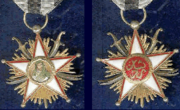Zulfiqar

Zulfiqar (Dhu'l-Fiqar) (Arabic: ذوالفقار) was the sword of Muhammad and his son-in-law, Ali. The scimitar is one of the oldest and best known symbols of Islam, as important to Muslims as Excalibur is to the British.
Ali's son, Imam Husayn bin Ali, used Zulfiqar against the Umayyad caliph Yazid I in the Battle of Karbala, where he and his family perished. As a symbol of honour and knighthood, Zulfiqar has appeared in the iconography of Islamic nations for centuries, and was used extensively by the Abbasid Caliphate and the Ottoman Empire. Multiple conflicting images of the sword exist. Some show two parallel blades to emphasize its mystical abilities and speed, while others portray a more traditionally-shaped scimitar and still others depict a split, V-shaped blade. The Shi'a, who believe Ali was the first rightful successor to Muhammad, consider the sword to be as exceptional a weapon as Ali was a knight. Their saying, "La fatà illa Ali, la saif illa Zulfiqar" ( لا فتى إلا على لا سيف إلا ذوالفقار ), "there is no hero except Ali, there is no sword except (his sword) Zulfiqar", was frequently inscribed on new weapons.
"Zulfiqar" and phonetic variations have been popular given names, as in former Pakistani Prime Minister Zulfikar Ali Bhutto. Various spelt variations exist in modern language scripts, including "Zulfikar", "Thulfiqar", "Dhulfaqar", "Zolfaqar", etc. "Zulfiqar", however, remains the most widely used rendition of the Arabic word.
History
The name is variously explained, but is generally thought to mean "cleaver of the spine", "the two-pronged one" or "double-edged one". It is sometimes also interpreted as "sharp distinction between right and wrong" or "the one who distinguishes between right and wrong", or "trenchant".
According to legend, Ali used the sword to slice an opponent and his horse in half, and had the angel Gabriel not intervened, the swing would have split the entire earth in two.
Recent times
The last Shah of Iran renamed the military order Portrait of the Commander of Faithful to the new reference, Order of Zolfaghar.
In 2004, Iran revealed a new Zulfiqar tank model
In August 2006, Iran announced a massive war games operation entitled The Blow of Zolfaghar.
